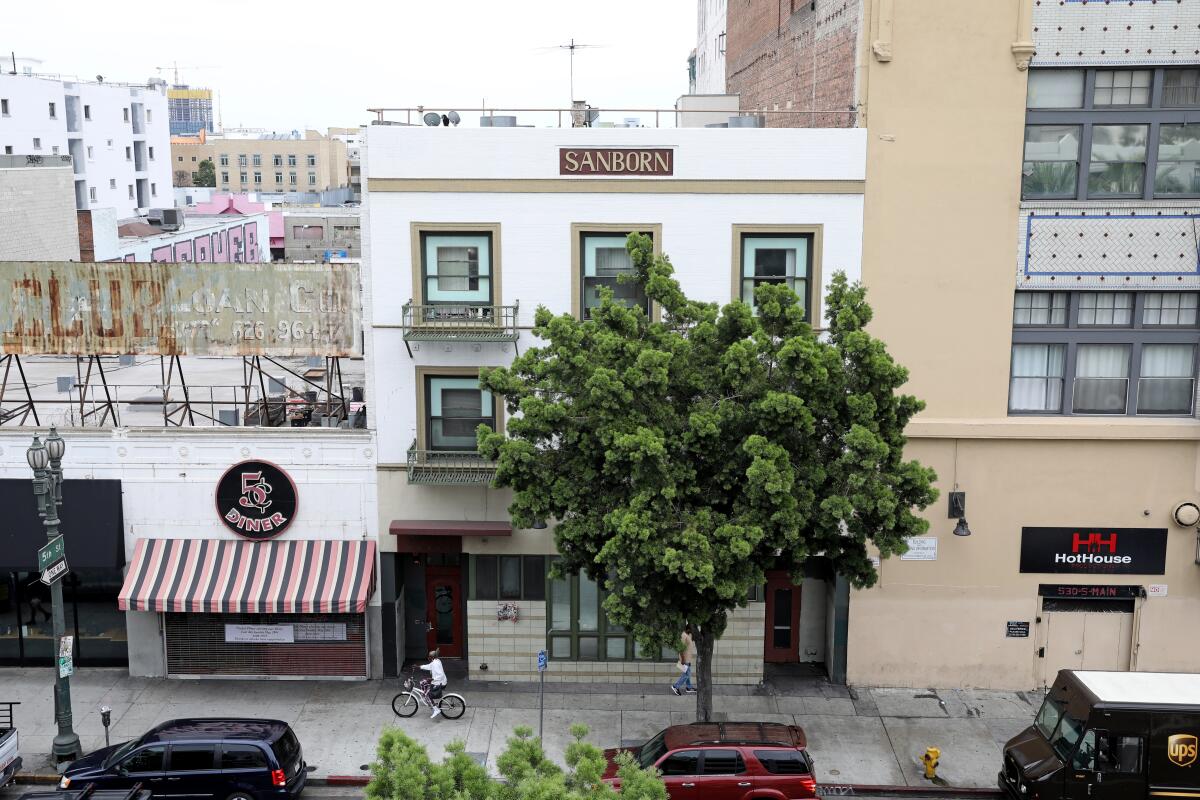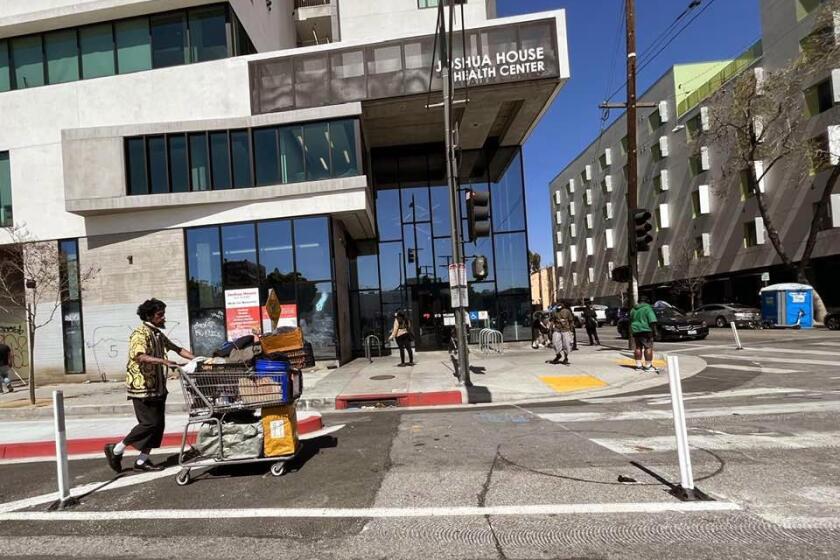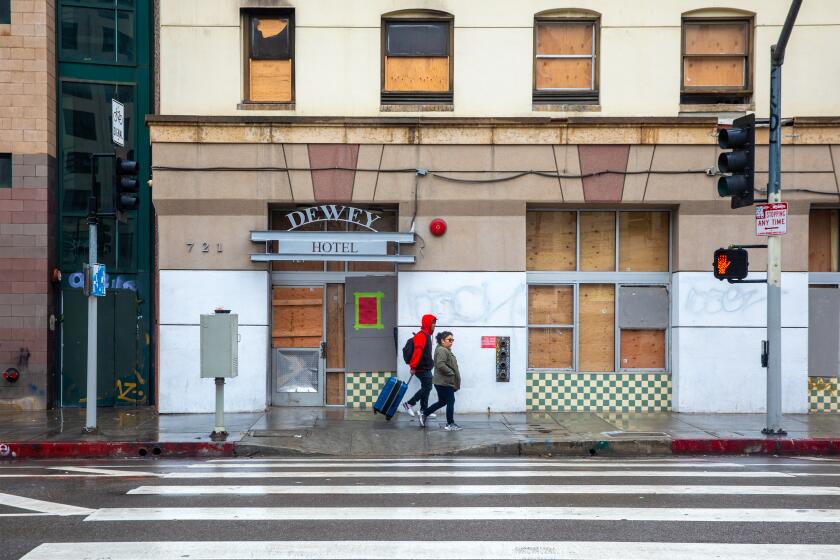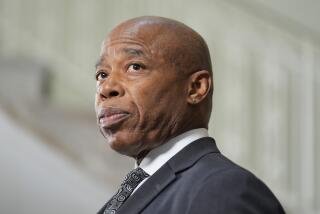Judge characterizes skid row housing receivership as ‘a mess’ for 1,500 tenants

In his own words, the judge was between “a rock and a hard place.”
The receiver he had appointed to bring 29 dilapidated buildings up to code was drowning in debt and blaming the city of Los Angeles for his failure to borrow additional funds.
An attorney for the city, which had recommended receiver Mark Adams to the court, was sniping at Adams’ performance and indicated that it was speaking with possible replacements.
Then the attorney representing Skid Row Housing Trust, the nonprofit operator of the buildings, accused Adams of misrepresenting the facts.
“I’m really starting to feel that there is such a disconnect in all the information, different stories from different folk, that the tenor of the receivership has grown very difficult,” Los Angeles Superior Court Judge Mitchell Beckloff interjected. “I don’t know how much problem solving has been going on.”
Beckloff repeatedly urged more than a dozen lawyers representing Adams, banks with loans on the properties, the city and Skid Row Housing Trust to stay focused on the purpose of the receivership.
“It was never intended for any building to be in the receivership for any other reason that the health and safety concerns,” he said, admonishing all the parties that his primary interest was the 1,500 tenants of the buildings.
Over the course of a nearly two-hour hearing Thursday afternoon, Beckloff attempted to sort out what he characterized as a “mess” for which he could not see an immediate remedy.
More than two months into the receivership, Adams had borrowed $1.8 million, spent all but $336,000 and owed $1.7 million for services rendered.
The receivership overseeing 1,500 tenants in Skid Row is on the verge of failing unless a L.A. Superior Court judge acts quickly, receiver Mark Adams said in court filings.
Adams said his money problems were so urgent that the receivership could fall apart as early as Friday if the judge did not approve additional funding.
“The big problem is that all of the security companies are going to walk off the job tomorrow if they’re not paid,” Adams said. “I’ve stalled them all pending this hearing.”
One of the firms had already left; its buildings are now covered by other companies. In interviews the day before the hearing, representatives of the receivership’s other two security firms said Adams had been paying them on time and gave no indication their departures were imminent.
“We haven’t had any problems with payment,” said George Casillas, executive director of Treston Security Services, which is staffing 14 properties.
Keith W. Boles, vice president of operations at American Eagle Protective Services, which is handling 10 buildings, said he had no reason to question Adams’ compliance with the firm’s contract until reading about the receivership’s financial troubles.
“We’re in a good place with them,” Boles said.
But John McKillop, president of a third firm, JRM Private Security, said he pulled his guards from 11 trust buildings in late May after going without payment for weeks.
Mark Adams is overseeing the welfare of 1,500 tenants in Skid Row. In prior cases involving Adams, tenants faced the risk of eviction and property owners lost their houses.
Contending that Adams had made scant progress on the primary purpose of the receivership — bringing the 29 buildings up to code — the city and preexisting creditors on seven of the newer and more financially viable buildings were asking the judge to remove them from the receivership and let other nonprofits make needed repairs.
Adams argued that the city had made it impossible for him to borrow more funds by demanding a limit of 10% interest, and that removing the seven most valuable buildings would further erode the receivership’s borrowing power by diluting its collateral.
Under questioning by Beckloff, Adams conceded that he had lenders who would come up with the needed cash in time, if he could pay them a higher rate of interest.
Deputy City Atty. Alia Haddad told Beckloff that the city was exploring other sources of funding but gave no details about how much it might obtain or when, or whether the City Council would have to authorize any financing plan in advance.
In orders from the bench, Beckloff authorized the lenders to remove the seven buildings from the receivership and gave the city through Tuesday to come up with $2 million to cover what Adams said were his past-due accounts and upcoming payroll. If the city failed, Beckloff said, Adams could borrow that amount at an interest rate as high as 15%.
The rulings did not address how Adams will pay for security and repairs going forward, as well as cover negative cash flow. Adams told the court that his property management company informed him that the rents it had collected might not cover its expenses.
A spokesperson for City Atty. Hydee Feldstein Soto said later that the office had no comment.
Adams was appointed two months ago after years of mismanagement and financial disarray left the Skid Row Housing Trust unable to pay its bills. The nonprofit housing provider — the largest in Skid Row — had slashed staffing and maintenance, leaving buildings in squalid conditions.
One of the most experienced receivers in the state, Adams has handled 300 such cases over more than two decades. But concerns over his selection for the job have been simmering since The Times reported in May that in some of his prior cases, tenants faced the risk of eviction and property owners lost their houses, while judges determined that he had inflated his fees by six-figure amounts.
Earlier this month, Feldstein Soto and other city officials blasted Adams after the property management firm he hired sent eviction notices to 451 tenants who were behind on rent. Feldstein Soto said the notices were illegal under city law and violated a promise Adams had made not to evict residents solely for nonpayment.
Tenants at Skid Row Housing Trust buildings were issued eviction notices that the city attorney’s office deemed illegal. The receiver overseeing the properties has rescinded them.
City Councilmember Nithya Raman, who chairs the Housing and Homelessness Committee, attended Thursday’s hearing alongside two staff members. A spokesperson for Raman did not respond to a request for comment.
Despite his obvious frustration with what he described as Adams’ “doublespeak,” Beckloff gave him a strong endorsement.
“I appointed you because I think you’re the person for this job,” he said. “I still think you’re the person for the job. I recognize that you’ve made significant and great efforts to deal with the issues.”
More to Read
Sign up for Essential California
The most important California stories and recommendations in your inbox every morning.
You may occasionally receive promotional content from the Los Angeles Times.















